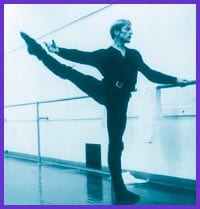As long as there has been film, there has been dance on film, so it’s fitting that there should be a festival dedicated to featuring dance films. Now in its ninth year, the cleverly named Moving Pictures Festival Of Dance On Film And Video presents more than 40 works ranging from features to experimental shorts to documentaries.
Let us make no mistake: Attempting to present the spirit of dance on film is a risky business. Done well and film and dance seem to merge, the former supporting the latter and providing new insight into the choreographer’s work. Poorly executed and two artforms are ruined: dancer, choreographer and filmmaker are all dismissed as sub-standard.
The point-and-shoot approach to filmmaking simply cannot capture the essence and power of even the strongest dance work. And so, Veronica Tennant’s Words Fail runs into serious trouble. Peggy Baker’s choreography and performance are described as “starkly emotional,” but unfortunately the fluidity and emotionality of the piece are continually disrupted by Tennant’s unsupportive camera angles and choppy editing choices.
In contrast, Rob Gray’s film of Owen Montague’s Arenal is exquisite. Carefully lit and thoughtfully shot, the result is beautiful. Key dance elements are underscored by intelligent editing and complementary camera work, so that the emotion of the piece, inspired by Costa Ricans living under a volcano, comes as much from the film’s make-up as it does from Caroline Richardson’s performance. (Words Fail and Arenal already screened opening night.)
Well worth catching is Annie Leibowitz’s Zoetrope, an engaging work featuring Mikhail Baryshnikov and Twyla Tharp. As much about cinema as it is about dance, the film places the dancers inside a giant zoetrope, an optical toy which prefigured the cinema. Leibowitz employs various film tricks to make the actual lack of movement in a moving picture very much apparent. While she demonstrates this, Leibowitz expands the notion of dance, as her subjects are not so much dancing as they are moving in a prescribed fashion.
(Zoetrope screens as part of a compilation of archival footage from Cinémathèque de la Danse in Paris at 7pm on Fri, Oct 20 at the John Spotton Cinema, 150 John St.)
The festival also features several documentaries, some of course rather better than others.
Just as short films need to be crafted to reflect their subjects, so too documentaries need to take a form which best expresses their object of study. Two which succeed in this are Jon Reiss’s Better Living Through Circuitry, a study of rave culture, and Lennart Pasborg’s Erik Bruhn: I’m The Same, Only More, a biopic of the renowned dancer by his close friend.
Better Living Through Circuitry is appropriately fast-paced and jammed with sound bites; it tries to show as many facets of rave as it possibly can. The result is overwhelming, but in a good way: By the time you emerge at the far end, the details of where you’ve been and what happened are pretty blurry, but you know you had a really good time. (It screens at 9pm on Sat, Oct 21 at John Spotton.)
Pasborg’s piece is stunning for its ability to demonstrate the passion and spirit of Bruhn through a meticulous yet quite simple collage of footage of the dancer – in his great roles, in rehearsal, in a garden dancing with his lover Rudolf Nureyev. Accompanied by Bruhn’s voice speaking about himself, the film allows him to remain inspiring yet enigmatic.
A moving picture, indeed. (Erik Bruhn screens with a doc about Betty Oliphant at 7pm on Sat, Oct 21 at John Spotton.)

 Why you can trust Xtra
Why you can trust Xtra


